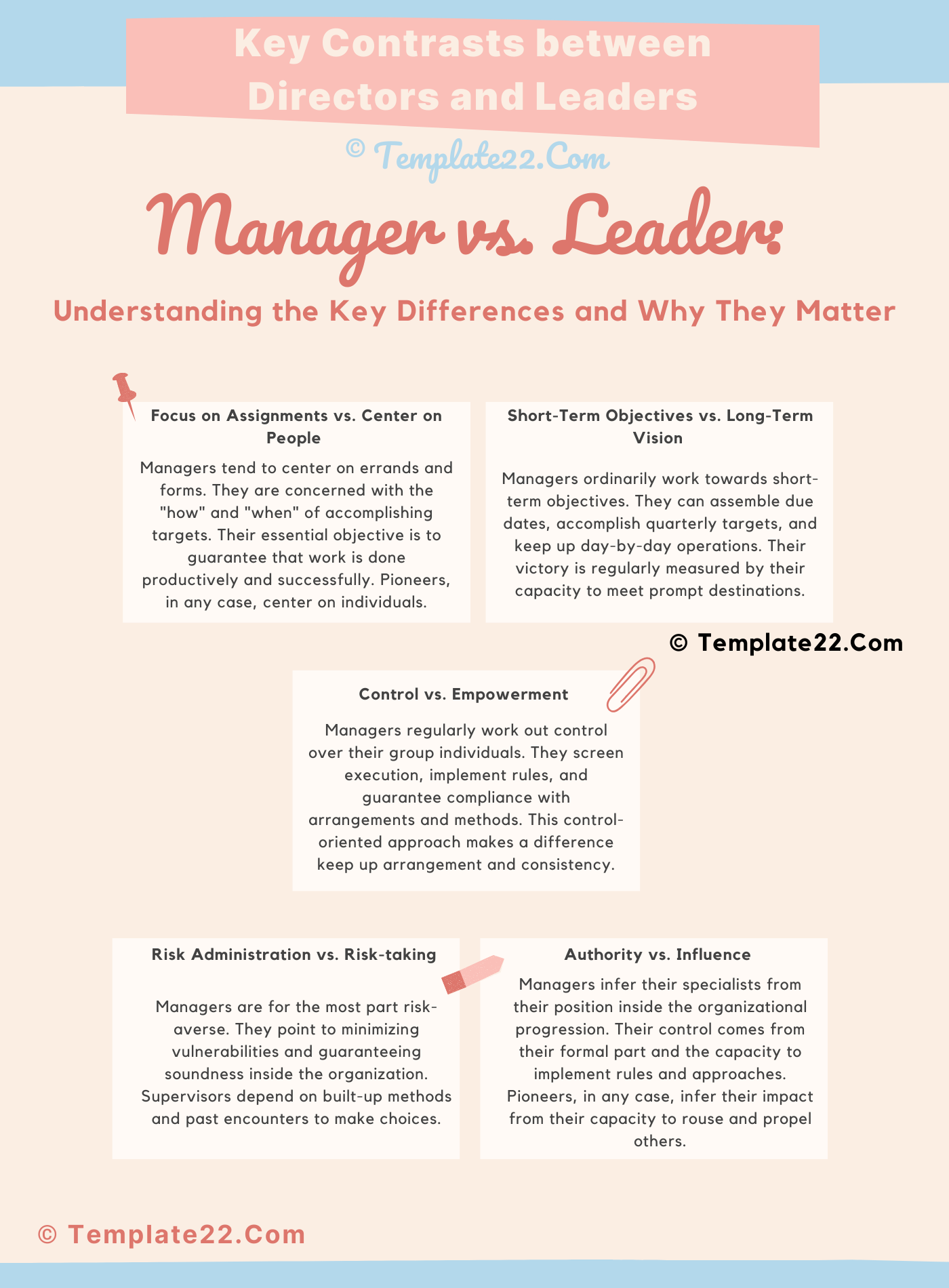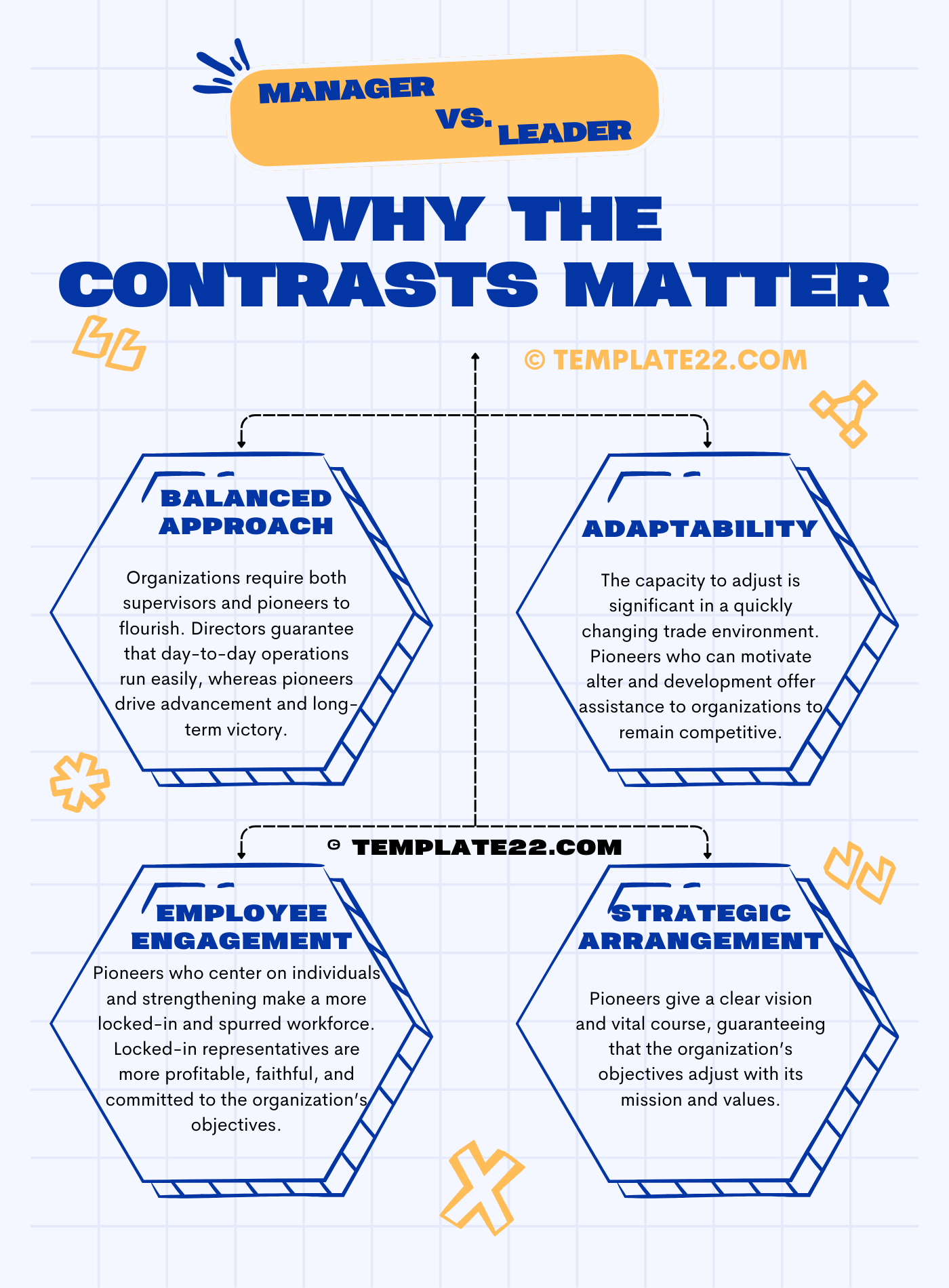Manager vs. Leader: Key Differences and Their Impact Explained
 In the corporate world, the terms “chief” and “pioneer” are regularly utilized and traded, however, they exemplify particular parts and duties. Understanding the Manager vs. Leader: Key Differences and Their Impact Explained is significant, as it can essentially affect the victory and culture of an organization. Whereas both supervisors and pioneers play basic parts, their approaches, objectives, and strategies for impacting others contrast significantly.
In the corporate world, the terms “chief” and “pioneer” are regularly utilized and traded, however, they exemplify particular parts and duties. Understanding the Manager vs. Leader: Key Differences and Their Impact Explained is significant, as it can essentially affect the victory and culture of an organization. Whereas both supervisors and pioneers play basic parts, their approaches, objectives, and strategies for impacting others contrast significantly.
Defining Directors and Leaders
A supervisor is essentially centered on directing and planning the operations of a group or division. Their primary obligations incorporate arranging, organizing, staffing, coordinating, and controlling assets to accomplish particular targets. Supervisors are frequently more concerned with forms, frameworks, and productivity. They guarantee that assignments are completed on time, within budget, and according to set standards.
Defining Directors and Leaders part 2:
On the other hand, a pioneer is somebody who motivates, propels, and guides people toward a shared vision. Pioneers are more concerned with impacting individuals, cultivating advancement, and driving alter. They center on creating a positive and profitable organizational culture, empowering individual and proficient development among group individuals, and building solid connections based on belief and respect.
Key Contrasts between Directors and Leaders
- Focus on Assignments vs. Center on People
Managers tend to center on errands and forms. They are concerned with the “how” and “when” of accomplishing targets. Their essential objective is to guarantee that work is done productively and successfully. Pioneers, in any case, center on individuals. They are more interested in the “why” behind activities and choices. Pioneers motivate and propel their group by making a sense of reason and direction.
- Short-Term Objectives vs. Long-Term Vision
Managers ordinarily work towards short-term objectives. They can assemble due dates, accomplish quarterly targets, and keep up day-by-day operations. Their victory is regularly measured by their capacity to meet prompt destinations. Pioneers, then again, are visionary. They see past the quick errands and center on long-term objectives and techniques. Pioneers are driven by a vision of the future and work to motivate others to endeavor towards that vision.
CLICK HERE TO DOWNLOAD 300+ PROJECT MANAGEMENT TEMPLATES & DOCUMENTS IN EXCEL
- Control vs. Empowerment
Managers regularly work out control over their group individuals. They screen execution, implement rules, and guarantee compliance with arrangements and methods. This control-oriented approach makes a difference keep up arrangement and consistency. Pioneers, in any case, engage their group individuals. They assign specialists, energize independence, and cultivate a sense of possession and responsibility. Pioneers accept in creating their team’s potential and supporting their growth.
- Risk Administration vs. Risk-taking
Managers are for the most part risk-averse. They point to minimizing vulnerabilities and guaranteeing soundness inside the organization. Supervisors depend on built-up methods and past encounters to make choices. Pioneers, on the other hand, are more inclined to take dangers. They grasp alter and development, understanding that advance regularly includes venturing into the obscure. Pioneers energize imaginative thinking and are willing to challenge the status quo.
- Authority vs. Influence
Managers infer their specialists from their position inside the organizational progression. Their control comes from their formal part and the capacity to implement rules and approaches. Pioneers, in any case, infer their impact from their capacity to rouse and propel others. Their control comes from their properties, such as judgment, compassion, and charisma, or maybe from their work title.
Why the Contrasts Matter
Understanding the contrasts between supervisors and pioneers is imperative for a few reasons:
- Balanced Approach: Organizations require both supervisors and pioneers to flourish. Directors guarantee day-to-day operations run easily, whereas pioneers drive advancement and long-term victory. An adjusted approach makes a difference organizations accomplish solidness and development simultaneously.
- Adaptability: The capacity to adjust is significant in a quickly changing trade environment. Pioneers who can motivate alter and development offer assistance to organizations to remain competitive. Supervisors who can actualize and oversee these changes successfully guarantee that the organization remains flexible and efficient.
- Employee Engagement: Pioneers who center on individuals and strengthening make a more locked-in and spurred workforce. Locked-in representatives are more profitable, faithful, and committed to the organization’s objectives. Directors who back their team’s advancement and well-being contribute to a positive work environment.
CLICK HERE TO DOWNLOAD 300+ PROJECT MANAGEMENT TEMPLATES & DOCUMENTS IN EXCEL
- Strategic Arrangement: Pioneers give a clear vision and vital course, guaranteeing that the organization’s objectives adjust with its mission and values. Supervisors interpret this vision into noteworthy plans and guarantee that assets are utilized proficiently to accomplish these goals.
In conclusion, whereas directors and pioneers have particular parts, both are fundamental for the victory of an organization. Supervisors center on assignments, forms, and short-term objectives, guaranteeing proficiency and solidness. Pioneers center on individuals, vision, and long-term victory, driving alter and development. Understanding these Manager vs. Leader to use the qualities of both directors and pioneers, making an energetic and effective environment.

